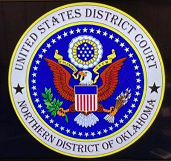A federal district judge on Friday, December 15, 2023, dismissed the Hooper v. Tulsa case, stating that the city does not have jurisdiction over municipal violations committed by tribal citizens.

Judge William P. Johnson, for the U.S. District Court for the Northern District of Oklahoma, stated in his ruling: "Tulsa no longer has jurisdiction over municipal violations committed by its Indian inhabitants."
The case involved Justin Hooper, a tribal citizen of the Choctaw Nation, who resides in the city of Tulsa, Okla. In 2018, Hooper was issued a speeding ticket by Tulsa police which resulted in a $150 fine imposed by Tulsa Municipal Criminal Court.
 Make A Donation Here
Make A Donation Here
In 2020, though, the U.S. Supreme Court’s McGirt v. Oklahoma decision ruled that a large swath of northeastern Oklahoma was still an Indian reservation, putting some court rulings into question.
Friday's ruling comes on the heels of a decision by the Tenth Circuit Court of Appeals in Denver that reversed a district court’s ruling on the case on June 28, 2023.
On Friday, Cherokee Nation Principal Chief Chuck Hoskin, Jr. issued a statement posted to the Cherokee Nation Facebook page.
"This summer, the 10th Circuit's Hooper v. City of Tulsa ruling upheld settled federal law, reaffirming that states and municipalities do not have criminal jurisdiction over tribal citizens on tribal land. The decision rejected to upend these legal principles by turning to defunct, territorial provisions of the Curtis Act. With this case now dismissed, the Cherokee Nation continues to support collaborative approaches on public safety that respect rather than attack tribal sovereignty," Hoskin said in the Facebook post.
Muscogee Nation Principal Chief David W. Hill said in a statement:
"We applaud the decision of the court to uphold the law and dismiss this frivolous case. The parties behind these politically-driven cases are working to make our state less safe. The McGirt decision means more police, courts, and prosecutors working to keep our communities peaceful. Oklahomans deserve that. That is why we have been asking Congress to pass legislation to fully empower tribes to prosecute anyone who violates the law on our reservations, and to enhance the ability of the tribes to broaden their law enforcement capabilities within the reservations for all Oklahomans.”
More Stories Like This
Navajo Resources and Development Committee Issues Notice on Livestock Inspection RequirementsAmerican Prairie, Tribal Coalition Files Protest Over Rescinded Grazing Rights
Northern Cheyenne Push Back Against Trump Administration’s Effort to Alter Little Bighorn History
Florida Man Sentenced for Falsely Selling Imported Jewelry as Pueblo Indian–Made
Navajo Nation Declares State Of Emergency As Winter Storm Threatens Region
Help us defend tribal sovereignty.
At Native News Online, our mission is rooted in telling the stories that strengthen sovereignty and uplift Indigenous voices — not just at year’s end, but every single day.
Because of your generosity last year, we were able to keep our reporters on the ground in tribal communities, at national gatherings and in the halls of Congress — covering the issues that matter most to Indian Country: sovereignty, culture, education, health and economic opportunity.
That support sustained us through a tough year in 2025. Now, as we look to the year ahead, we need your help right now to ensure warrior journalism remains strong — reporting that defends tribal sovereignty, amplifies Native truth, and holds power accountable.
 The stakes couldn't be higher. Your support keeps Native voices heard, Native stories told and Native sovereignty defended.
The stakes couldn't be higher. Your support keeps Native voices heard, Native stories told and Native sovereignty defended.
Stand with Warrior Journalism today.
Levi Rickert (Potawatomi), Editor & Publisher

